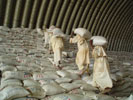
Over at change.org, Michelle and Michael have begun an inspired rumble over the role of advocacy organizations in responding to Darfur. As someone who has worked on both sides of this issue, starting out with a humanitarian agency but now on the advocacy side of the house, there are a few points I think are worth making:
Michael asserts that, “Any organization which claims it can save Darfur is courting hubris, at the least.” Point taken, but without political pressure toward such an ambitious goal, the policies of the United States and its allies drift away from actually making the difficult decisions to end a crisis, and instead merely seek to manage its consequences. Like it or not, governments and other political actors effectively deputize humanitarians to be the chief consequence managers of ongoing atrocities in places like Darfur. I have nothing but respect for those aid workers on the frontlines around the world delivering emergency aid and fostering recovery from armed conflict, but we need to recognize that sometimes policymakers cloak themselves in the warm glow of providing humanitarian aid as an excuse for not undertaking the hard diplomacy needed to end conflicts. As my colleague John Norris notes, at one point during the Bosnian conflict a resident of Sarajevo complained of the international community, “They just want to make sure we are well fed when we are shot.”
Humanitarian relief is essential but it is no substitute for political strategies and conflict resolution policies that would actually help to end conflict. USAID officials sound mighty impressive before congressional committees when they list the size and scale of U.S. resources devoted to food aid or healthcare in a place like Sudan, and there is no talking point more prized by administration officials than saying “America is the largest provider of humanitarian aid” to any given conflict zone. On-the-ground aid workers are humble about their important work; policymakers in Washington are not.
So when Michael suggests that neither the U.S. nor Europe has the leverage to bring peace to Darfur, I wonder how he’s come to such a conclusion. Nobody knows exactly how much leverage the United States, Europe, or any combination of governments may have against Khartoum and the Darfur rebels, because there has been no consistent effort to use that leverage and lead a viable peace process, such as that which helped to resolve Sudan’s North-South civil war. All we have experience to-date has been the all-bark, no-bite approach of the Bush administration. It’s up to the Obama team to try something different, and the pressure brought by a growing anti-genocide constituency in the United States will help hold their feet to the fire.
I couldn’t agree more with Michael and Michelle that stopping genocide is a long-term endeavor and that expectations need to be managed. But if activists don’t keep trying to save Darfur, no one else will, and from South Africa to the American civil rights movement, we have seen again and again that activists can accomplish things that once seemed impossible.

